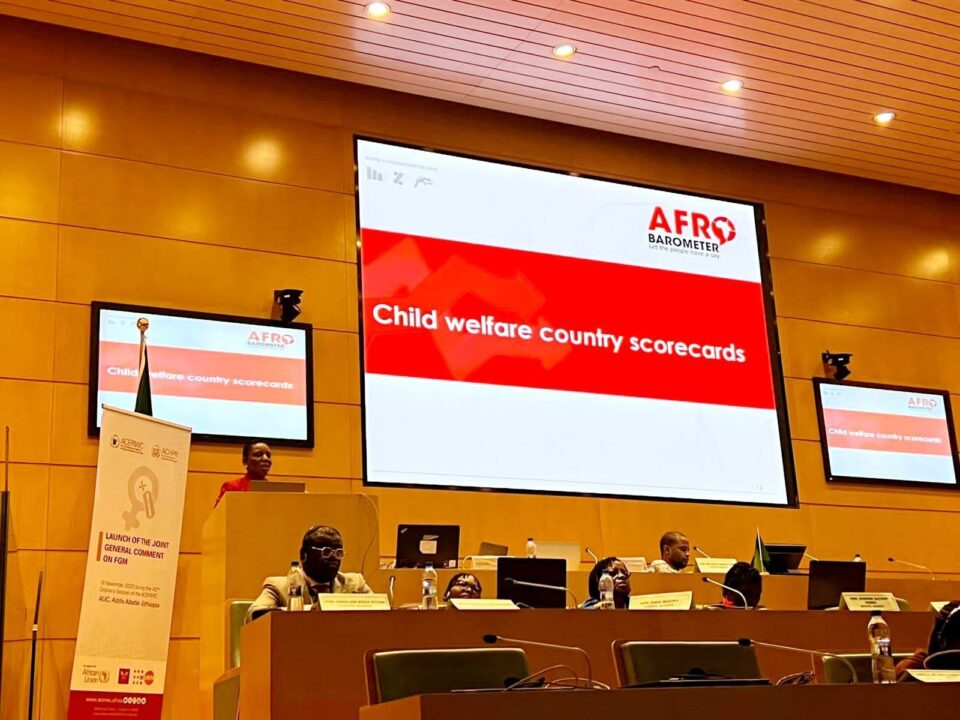PHOTO: Anyway Chingwete, Afrobarometer deputy director of surveys, unveiling the scorecards at the 42nd Ordinary Session of the African Committee of Experts on the Rights and Welfare of the Child (ACERWC) in Addis
Afrobarometer, in collaboration with Laws.Africa, and the Data for Governance Alliance, unveiled a new series of country scorecards Saturday emphasising the need for enhanced efforts to improve the well-being of vulnerable children in Africa.
The child well–being country scorecards graphically summarise Afrobarometer Round 9 (2021/2023) survey findings detailed in its latest Pan–Africa Profile. They highlight African citizens’ views on physical discipline of children, the frequency of neglect and abuse of children, and whether there is help for vulnerable children at the community level. Unveiling the scorecards at the 42nd Ordinary Session of the African Committee of Experts on the Rights and Welfare of the Child (ACERWC) in Addis Ababa, Anyway Chingwete, Afrobarometer deputy director of surveys, said that the use of physical force to discipline children still has solid support among African adults, even if opposition is slowly growing.
“Across 33 countries surveyed in both Round 7 (2016/2018) and Round 9 (2021/2023), 16 show significant declines in support for corporal punishment, including sharp drops in Tanzania, Kenya, Botswana, and Liberia,” she said. ”This trend suggests that international condemnation of corporal punishment and an increasing emphasis on children’s rights, as endorsed in the UN Convention on the Rights of the Child and the African Charter on the Rights and Welfare of the Child, may be having an effect.”
The findings also show that most Africans say child abuse and neglect are uncommon, and more than half report that services are available in their community to support children who are abused or neglected, children with disability, and children and adults with mental or emotional problems. But fewer than half think their government is doing a good job of protecting and promoting the well-being of vulnerable children. These assessments vary widely by country and respondents’ economic status, suggesting opportunities for interventions to strengthen child welfare. Information from the Laws.Africa platform also shows that out of the 39 surveyed countries, only Morocco and Tunisia are yet to ratify the African Charter on the Rights and Welfare of the Child.
Yvonne Tagwireyi, external expert at ACERWC, described the scorecards as a valuable governance and accountability tool for assessing African governments’ performance on critical well-being indicators.
“In order for Africa to achieve the aspirations of the Agenda 2063, and more importantly Agenda for Children 2040, we urgently require data that is generated in Africa to inform policy and practice,” she said. “These scorecards will contribute towards the evidence that
Key findings
Use of physical force to discipline children:
- On average across 39 countries, six in 10 Africans (61%) say parents are justified in using physical force to discipline their children. Approval of corporal punishment has declined modestly over the past five years.
o While support for physical discipline approaches nine out of 10 citizens in Benin (88%), Cameroon (87%), Burkina Faso (86%), and Niger (85%), 16 countries record significant decreases since 2016/2018, including sharp drops in Tanzania (-31 points), Kenya (-24 points), Botswana (-22 points), and Liberia (-22 points).
Child abuse, mistreatment, and neglect:
- About one-third (35%) of citizens say child abuse, mistreatment, and neglect are “somewhat frequent” or “very frequent” in their community, while 64% describe these as infrequent occurrences. Perceptions of widespread abuse range from 16% in Tanzania to 63% in Liberia.
Support services for vulnerable children:
- Majorities say services are available in their community to support children who are abused or neglected (58%), children with disability (56%), and children and adults with mental or emotional problems (52%).
Government performance on promoting child welfare:
- On average, only 44% of Africans approve of their government’s performance on protecting and promoting the well-being of vulnerable children. Economically disadvantaged citizens are least likely to see their government’s efforts as adequate.
About Afrobarometer
Afrobarometer (AB) is a trusted source of high-quality data and analysis on what Africans are thinking. With an unmatched track record of more than 370,000+ interviews in 42 countries, representing the views of 75% of the African population, AB is leading the charge to bridge the continent’s data gap. AB data inform many global indices, such as the Ibrahim Index of African Governance, Transparency International’s Global Corruption Barometer, and the World Bank’s Worldwide Governance Indicators. The data are also used for country risk analyses and by credit rating and forecasting agencies such as the Economist Intelligence Unit. All AB data sets are publicly available on the website and may be analysed free of charge using AB’s online data analysis tool.

